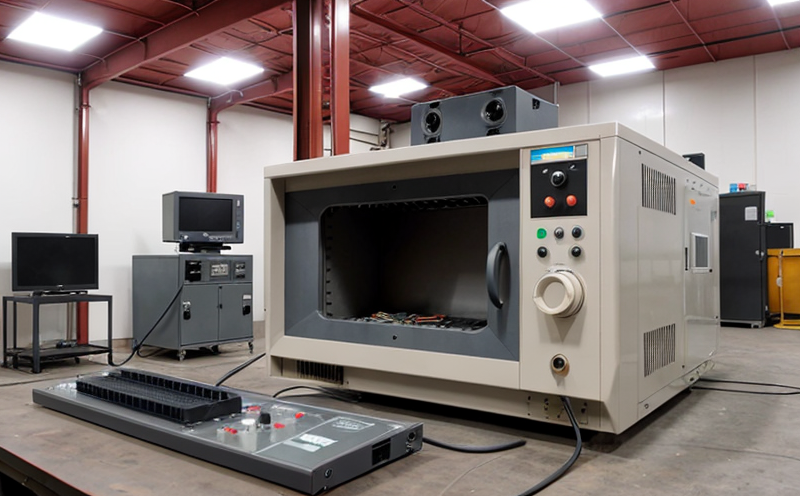IEC 61800 3 EMC Testing for Adjustable Speed Drives
The IEC 61800-3 standard is a cornerstone of electromagnetic compatibility (EMC) testing specifically tailored for adjustable speed drives (ASDs). These devices are integral components in modern industrial and commercial applications, controlling the speed of electric motors to optimize energy efficiency and performance. The EMC requirements set by this standard ensure that ASDs do not interfere with other electronic equipment and can operate reliably within their intended environment.
The testing protocol outlined in IEC 61800-3 is designed to evaluate the electromagnetic compatibility of ASDs, focusing on three main aspects: radiated emission (EMI), conducted emissions, and immunity. Compliance with this standard ensures that the ASDs meet stringent international standards for electromagnetic interference (EMI) and can coexist harmoniously in complex industrial settings.
The testing procedure involves several stages, each critical to ensuring compliance with IEC 61800-3:
- Initial Assessment: This phase includes a detailed review of the ASD's design and operational specifications. It ensures that all potential sources of electromagnetic interference are identified early in the process.
- Preparation: The ASD is prepared for testing by connecting it to appropriate test equipment, such as radiated field antennas, conducted emissions measurement systems, and immunity test setups.
- Testing: This involves a series of tests aimed at assessing both the emission characteristics and the immunity of the ASD. Emission tests check if the device produces unwanted radio frequency interference that could disrupt other equipment. Immunity tests verify the device's resilience to external electromagnetic interference, ensuring it functions correctly in an environment filled with electronic devices.
- Reporting: Once the testing is complete, a comprehensive report summarizing all test results and findings is prepared. This document serves as evidence of compliance with IEC 61800-3 standards and helps quality managers and compliance officers make informed decisions about product certification and market entry.
The importance of IEC 61800-3 cannot be overstated, particularly in sectors where the reliability and performance of electronic equipment are critical. By adhering to these stringent EMC standards, manufacturers can ensure that their ASDs meet global regulatory requirements, enhance product safety, and improve overall system integrity.
Industry Applications
The IEC 61800-3 standard finds extensive application across various industries where adjustable speed drives are essential. Industries such as manufacturing, oil & gas, pharmaceuticals, and transportation benefit significantly from the robust EMC testing provided by this standard.
- Manufacturing: In industrial settings, ASDs are used to control machinery that requires precise speed regulation. Compliance with IEC 61800-3 ensures that these systems can operate without causing interference or being disrupted by other equipment in the plant.
- Oil & Gas: The harsh environments of oil rigs and refineries demand robust electronic components that can withstand extreme conditions. EMC testing according to IEC 61800-3 helps ensure that ASDs can function reliably under these challenging circumstances.
- Pharmaceuticals: In this highly regulated industry, the integrity and reliability of equipment are paramount. EMC compliance ensures that ASDs do not introduce unwanted electromagnetic interference that could affect sensitive medical devices or data systems.
- Transportation: From electric vehicles to automated train systems, adjustable speed drives play a crucial role in optimizing performance and efficiency. EMC testing according to IEC 61800-3 ensures that these systems operate seamlessly without causing interference in complex transportation networks.
The versatility of ASDs across these industries underscores the significance of stringent EMC testing to maintain system reliability, enhance safety, and comply with international standards.
Why Choose This Test
Selecting IEC 61800-3 EMC testing for adjustable speed drives is a strategic decision that offers numerous benefits:
- Global Recognition: Compliance with this standard ensures that your ASDs meet international standards, opening doors to global markets.
- Enhanced Reliability: By ensuring the device operates within specified EMC limits, you reduce the risk of interference and downtime, leading to higher system reliability.
- Cost-Effective: Early identification and rectification of potential issues during testing can prevent costly reworks or product recalls down the line.
- Regulatory Compliance: Many regions have stringent regulations on electromagnetic interference. IEC 61800-3 provides a clear path to compliance, avoiding potential legal complications.
- Promotes Safety: By ensuring that your ASDs do not cause or are susceptible to electromagnetic interference, you enhance the overall safety of the systems in which they operate.
- Innovation and Differentiation: Demonstrating adherence to this stringent standard can set your product apart from competitors, positioning it as a leader in quality and reliability.
The comprehensive nature of IEC 61800-3 testing ensures that your adjustable speed drives are not only reliable but also safe and compliant with international standards. This ultimately translates to enhanced customer satisfaction and market competitiveness.
Competitive Advantage and Market Impact
The competitive landscape in industrial and commercial electronics is increasingly stringent, driven by global regulatory pressures and the growing importance of sustainability. By choosing IEC 61800-3 EMC testing for your adjustable speed drives, you position yourself at the forefront of this evolving environment:
- Increased Market Access: Compliance with international standards like IEC 61800-3 broadens market access to regions that strictly enforce these regulations.
- Better Customer Trust: A commitment to high-quality testing and compliance builds trust with customers, leading to long-term relationships and repeat business.
- Innovation Leadership: Demonstrating leadership in EMC testing can be a key differentiator in the market, attracting innovative projects and partnerships.
- Sustainability Focus: By ensuring your products meet stringent EMC standards, you contribute to reducing electromagnetic pollution, aligning with broader sustainability goals.
The impact of this choice extends beyond individual product performance; it contributes to the overall resilience and reliability of interconnected systems in industrial settings. This strategic approach not only enhances your competitive edge but also fosters a safer and more efficient global infrastructure.





